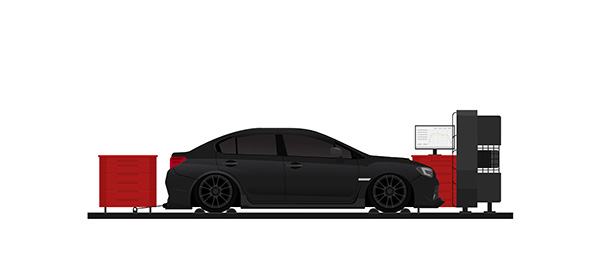
Plenty of drivers talk about horsepower, torque, and how fast their car feels, but numbers don’t lie—and that’s where a dyno test comes in. A dynamometer puts your car through its paces in a controlled setting, measuring real-world performance like wheel horsepower and torque across the rev range.
It’s not just about bragging rights—dyno testing helps reveal hidden issues, confirm the benefits of performance upgrades, or fine-tune your engine for better drivability and efficiency. Want to know what your car is actually putting down on the pavement? The dyno gives you the answer.
What Is a DYNO Test
At its core, a dyno test measures the force your engine can generate—and how efficiently it translates that power to the wheels. The car is strapped down to a platform with rollers that spin as the tires turn. As you accelerate, the dyno records various performance metrics, including horsepower, torque, and engine RPM.
Depending on the setup, there are two main types of dynamometers:
Engine dyno: Tests the engine alone, outside the vehicle, typically during or after a rebuild.
Chassis dyno: Tests the car with the engine and drivetrain intact, measuring power at the wheels.
At Chicane Motorsport, we use a chassis dyno, which gives a real-world picture of what your vehicle is actually putting down on the pavement in Olathe, KS—not just what it’s rated for at the crank.
What Does a DYNO Test Actually Measure
A dyno test offers a detailed snapshot of your vehicle’s performance. Here’s what it reveals:
- Wheel Horsepower (WHP): This is the actual power that reaches your wheels, factoring in drivetrain losses.
- Torque: How much twisting force the engine produces, which affects acceleration and towing ability.
- Air-Fuel Ratio: A critical measurement for tuning; it shows whether your engine is running rich (too much fuel) or lean (too little fuel).
- RPM Range: The engine’s behavior across the rev band—where power builds, drops, or plateaus.
- Boost Levels (for turbo/supercharged cars): The dyno can track how boost pressure behaves under full load.
These figures help drivers and technicians understand how the vehicle behaves under stress, where performance can be improved, and how different mods are actually affecting output.
Why Get a DYNO Test
There are plenty of reasons to put your car on a dyno, even if you’re not heading to the track.
If you’ve made upgrades—like a new intake, exhaust, turbo setup, or ECU tune—a dyno test is the only way to see exactly how much performance you’ve gained. It’s also a valuable tool for:
- Verifying performance claims from aftermarket parts or tunes
- Diagnosing issues like power loss, misfiring under load, or poor throttle response
- Optimizing fuel and ignition maps for a custom-tune
- Preparing for racing or autocross events
Even stock cars can benefit from a dyno session. You might discover that your vehicle is underperforming due to aging components or a restricted fuel system—problems you’d never notice in casual driving.
What Happens During the Test
Once the vehicle is securely strapped down on the dyno, the technician will run the car through several pulls. That means starting from a low RPM and accelerating at full throttle through the gears (usually in 3rd or 4th, depending on the drivetrain). The dyno collects data throughout each run.
Afterward, the results are reviewed using software that shows your power and torque curves, air-fuel ratios, and other diagnostic info. A tuner may use this data to adjust engine settings and perform another run to confirm improvements.
It’s a process of fine-tuning that requires both experience and attention to detail—especially when aiming for maximum power without sacrificing reliability.
DYNO Testing Isn’t Just for Racers
A lot of people assume dyno testing is only for high-performance builds, but even everyday drivers can benefit from it. If you feel your car isn’t as responsive as it used to be, or if you’re considering future upgrades, a dyno test gives you a solid starting point. It helps you track changes over time, make smarter mod choices, and prevent power-robbing issues before they become serious.
And for shops like us, it’s also a way to make sure customers are getting real results, not just theoretical improvements.
Looking to get the most out of your engine? Whether you’re fine-tuning a race setup or just curious about what your car’s really capable of, Chicane Motorsport in Olathe, KS offers professional dyno testing and performance analysis. We specialize in German car tuning and race prep, and we back our numbers with real data—not guesses.